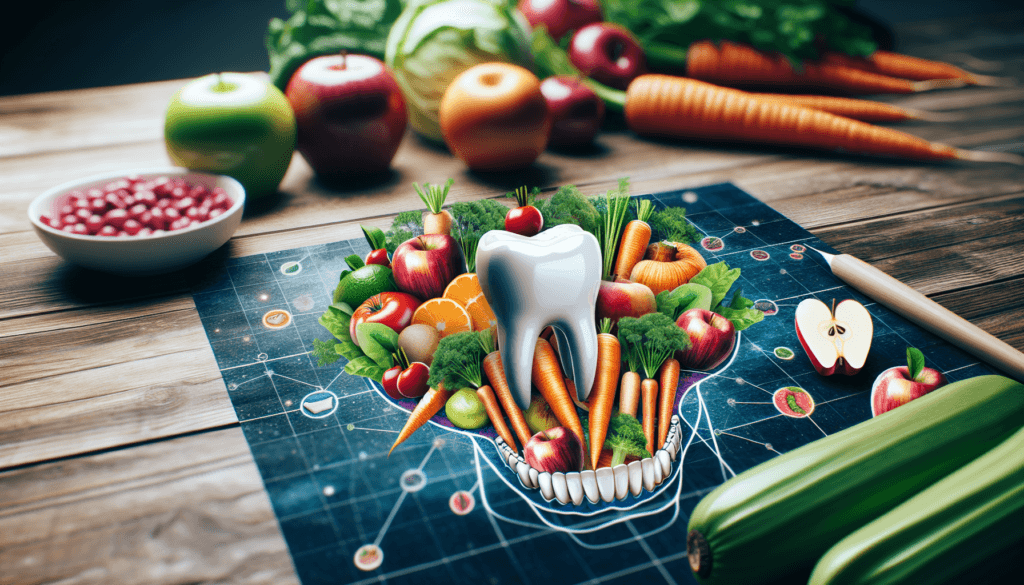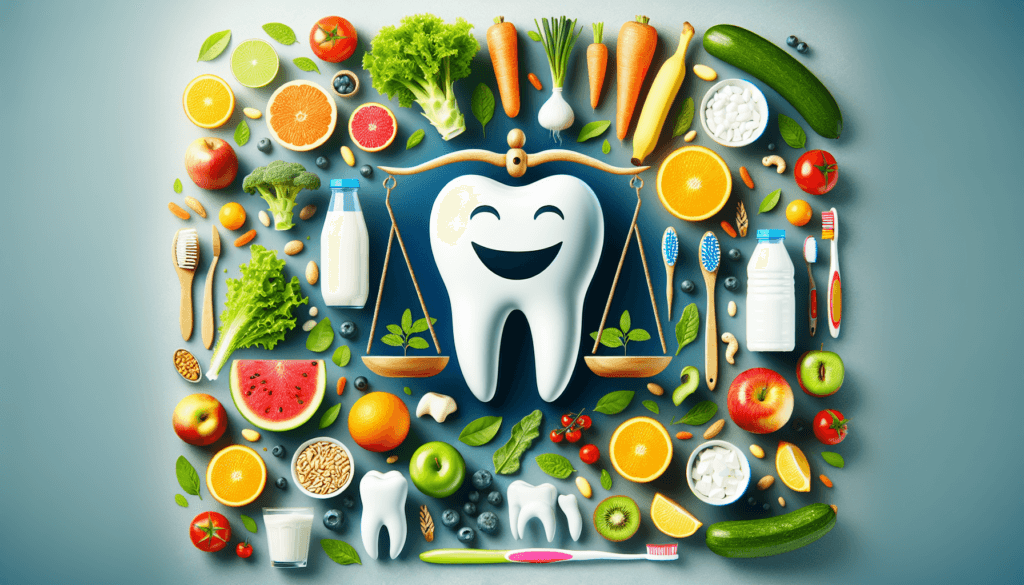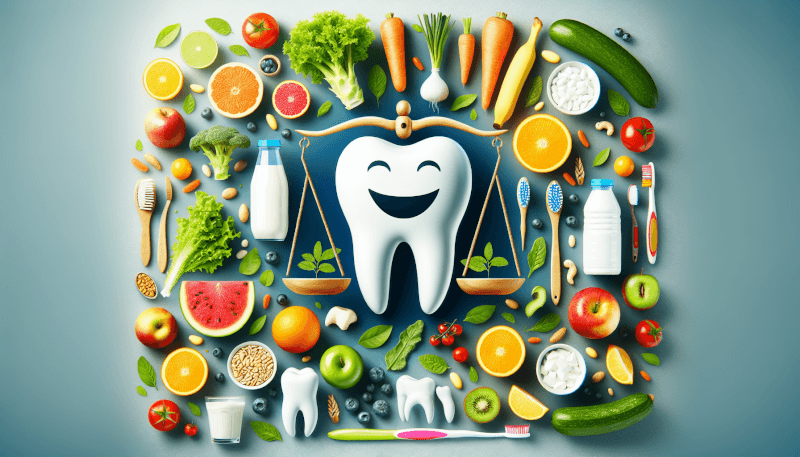Are you a boomer looking to maintain healthy teeth and gums? Well, look no further than the power of nutrition! In this article, we will explore the ways in which you can keep your pearly whites in top-notch condition by making simple changes to your diet. From incorporating tooth-friendly foods to avoiding detrimental substances, we’ll provide you with the key ingredients for a vibrant and healthy smile. So, grab a cup of tea and get ready to discover the mouth-watering secrets to maintaining your dental health!

The Importance of Oral Health for Boomers
As we age, it becomes increasingly important to take care of our oral health. Boomers, in particular, need to pay close attention to their teeth and gums in order to maintain optimal oral health. Understanding the unique needs of aging teeth and gums, as well as the factors that can affect oral health in boomers, is essential for keeping your smile healthy and bright.
Understanding the Needs of Aging Teeth and Gums
As we get older, our teeth and gums go through various changes that can impact our overall oral health. For example, tooth enamel naturally wears down over time, making teeth more susceptible to decay and sensitivity. Additionally, receding gums are common in older adults, which can lead to gum disease and tooth loss if not properly addressed.
Factors Affecting Oral Health in Boomers
There are several factors that can affect oral health in boomers. One of the most significant is a shift in hormones, particularly in women going through menopause. Changes in hormone levels can result in dry mouth, which increases the risk of tooth decay and gum disease. Other factors that can impact oral health in boomers include certain medications, smoking, and underlying health conditions such as diabetes or osteoporosis.
Eating a Balanced Diet for Healthy Teeth and Gums
A balanced diet plays a crucial role in maintaining healthy teeth and gums. By consuming the right nutrients, you can support the strength and integrity of your teeth and gums, reducing the risk of oral health issues.
Essential Nutrients for Strong Teeth and Gums
Calcium and vitamin D are key nutrients for maintaining strong teeth and gums. Calcium helps strengthen tooth enamel, while vitamin D is necessary for proper absorption of calcium. Including dairy products, leafy greens, and fortified foods in your diet can help ensure you’re getting adequate amounts of these nutrients.
Foods Rich in Calcium and Vitamin D
Dairy products, such as milk, cheese, and yogurt, are excellent sources of calcium and vitamin D. If you’re lactose intolerant or following a plant-based diet, you can opt for fortified plant-based milks, tofu, or green leafy vegetables like kale and broccoli. These foods not only provide calcium and vitamin D but also support overall bone health.
The Role of Vitamin C in Gum Health
Vitamin C is essential for maintaining healthy gums. It helps promote collagen production, which is necessary for gum tissue repair and maintenance. Citrus fruits, berries, peppers, and leafy greens are all excellent sources of vitamin C and can be easily incorporated into your diet.
Importance of Phosphorus for Teeth Strength
Phosphorus is another crucial nutrient for teeth strength. It works in conjunction with calcium to build and restore tooth enamel. Seafood, lean meats, nuts, and legumes are all rich sources of phosphorus.
Benefits of Omega-3 Fatty Acids for Oral Health
Omega-3 fatty acids have been shown to have anti-inflammatory properties, which can help reduce the risk of gum disease. Fatty fish like salmon and trout, as well as flaxseeds and walnuts, are great sources of omega-3s.

Avoiding Foods and Habits that Harm Dental Health
In addition to incorporating nutritious foods into your diet, it’s important to avoid foods and habits that can harm your dental health. By being aware of these potential risks, you can protect your teeth and gums from damage.
Sugary Foods and Beverages: The Enemy of Teeth
Frequent consumption of sugary foods and beverages can lead to tooth decay and cavities. Bacteria in your mouth feed on the sugars, producing acids that erode tooth enamel. Limiting your intake of sugary treats, sodas, and sugary juices can help prevent dental issues.
Acidic Foods and Their Impact on Tooth Enamel
Acidic foods, such as citrus fruits, tomatoes, and vinegar-based dressings, can weaken tooth enamel over time. While these foods can still be enjoyed as part of a balanced diet, it’s essential to rinse your mouth with water afterward to minimize the acid’s harmful effects.
Staining Foods and Beverages to Watch Out for
Certain foods and beverages, such as coffee, tea, red wine, and dark berries, have the potential to stain your teeth over time. Moderation and good oral hygiene practices, such as brushing after consuming these foods or beverages, can help mitigate this issue.
The Dangers of Chewing Ice and Hard Candies
Chewing on ice or hard candies may seem harmless, but it can actually cause serious damage to your teeth. These habits can lead to cracked or chipped teeth, which may require dental intervention to repair.
Smoking and Its Detrimental Effects on Dental Health
Smoking not only poses significant health risks but also has detrimental effects on your oral health. It can cause tooth staining, gum disease, tooth loss, and even oral cancer. Quitting smoking is crucial for maintaining healthy teeth and gums.
Hydration and Its Impact on Oral Health
Staying properly hydrated is essential for maintaining optimal oral health. Water plays a crucial role in saliva production, which helps wash away bacteria and food debris, neutralize acids in the mouth, and remineralize teeth.
The Connection Between Dry Mouth and Dental Problems
Dry mouth, or xerostomia, is a common issue in older adults and can significantly impact oral health. Saliva helps prevent tooth decay by neutralizing acids and providing essential minerals to teeth. When there’s a lack of saliva, the risk of cavities and gum disease increases. If you experience chronic dry mouth, it’s important to speak with your dentist for proper management.
Tips for Staying Hydrated for Optimal Oral Health
To stay properly hydrated, it’s recommended to drink water throughout the day. Avoid sugary or acidic beverages as much as possible, as they can contribute to dental problems. If you find it challenging to drink an adequate amount of water, try flavoring it with fruits or herbs to make it more appealing.
Water as the Best Beverage Choice for Teeth and Gums
Water is the best beverage choice for maintaining healthy teeth and gums. It not only hydrates your body but also helps cleanse your mouth, promotes saliva production, and helps maintain a balanced pH level. Drinking water after meals and snacks can help wash away food particles and reduce the risk of dental issues.

Optimizing Oral Health with Dietary Habits and Practices
In addition to maintaining a balanced diet, certain dietary habits and practices can further optimize your oral health. These practices can complement your oral hygiene routine and help keep your teeth and gums in great condition.
Maintaining Proper Oral Hygiene Regimen
Maintaining proper oral hygiene is essential for everyone, regardless of age. Brushing your teeth at least twice a day with fluoride toothpaste and flossing daily helps remove plaque and prevent gum disease and tooth decay. Additionally, using mouthwash can help kill bacteria and freshen your breath.
The Benefits of Chewing Sugarless Gum
Chewing sugarless gum can help stimulate saliva flow and reduce the risk of cavities. It also helps clean teeth by removing food particles and stimulating the production of saliva, which helps neutralize acids. Look for gum with xylitol, a natural sweetener that has been shown to have dental benefits.
Using Fluoridated Products for Strong Teeth
Fluoride is a mineral that helps strengthen tooth enamel and prevent tooth decay. Using fluoridated toothpaste and drinking fluoridated water can help protect your teeth. If your water supply doesn’t contain fluoride, consult with your dentist about fluoride supplements or topical treatments.
Applying Remineralizing Agents and Mouthwashes
Remineralizing agents, such as toothpaste or mouthwash with added calcium and phosphate, can help restore minerals to your teeth and strengthen enamel. Additionally, using mouthwashes that contain antibacterial properties can help kill harmful bacteria and promote gum health.
Supplements and Vitamins for Improved Dental Well-being
While a balanced diet should provide most of the necessary nutrients for good oral health, some boomers may benefit from supplements and vitamins targeted towards dental well-being. Consulting with your healthcare provider or dentist can help determine if supplements are appropriate for you.
Considering Calcium and Vitamin D Supplements
If you struggle to meet your calcium and vitamin D needs through your diet alone, supplements may be beneficial. However, it’s important to consult with a healthcare professional before starting any new supplements to ensure they are appropriate for your specific needs.
Benefits of Vitamin C Supplements for Gum Health
In some cases, a vitamin C supplement may be recommended, especially for those who have difficulty consuming enough fruits and vegetables in their daily diet. Vitamin C plays a crucial role in maintaining healthy gums and supporting collagen production.
Using Probiotics for Oral Health Improvement
Probiotics are beneficial bacteria that can promote oral health by reducing harmful bacteria and supporting a balanced oral microbiome. Probiotic supplements or consuming probiotic-rich foods like yogurt can help improve oral health.
Exploring Omega-3 Supplements for Strong Teeth and Gums
Omega-3 fatty acid supplements, such as fish oil capsules, can be considered for their potential anti-inflammatory properties and benefits to gum health. However, it’s important to consult with a healthcare professional before starting any supplements to ensure they are safe and appropriate for you.

Understanding Special Dental Needs in Boomer Years
As we age, certain oral health conditions become more prevalent in boomers. Understanding and addressing these special dental needs is crucial for maintaining optimal oral health.
Common Oral Health Conditions in Boomers
Gum disease, tooth decay, tooth loss, and oral cancer are some of the common oral health conditions that affect boomers. Regular dental check-ups and proper oral hygiene practices are key to preventing and treating these conditions.
Denture Care and Maintenance
For those who wear dentures, proper care and maintenance are essential. Dentures should be cleaned daily with a denture cleaner and a soft-bristle brush. It’s also important to remove dentures at night to give your gums and jawbone a chance to rest.
Managing Dry Mouth in the Elderly
As mentioned earlier, dry mouth is a common issue in older adults. To manage dry mouth, drinking plenty of water, using a humidifier in your home, and chewing sugarless gum can help stimulate saliva production. Additionally, avoiding alcohol, caffeine, and tobacco can minimize dry mouth symptoms.
Regular Dental Visits for Healthy Teeth and Gums
Regular dental visits are fundamental to maintaining healthy teeth and gums, regardless of age. These visits allow your dentist to assess your oral health, clean your teeth, and detect any potential issues early on.
The Importance of Dental Check-ups and Cleanings
Dental check-ups and cleanings should be scheduled at least twice a year to ensure optimal oral health. These visits allow your dentist to examine your teeth and gums, identify any signs of disease or decay, and provide professional cleaning to remove plaque and tartar buildup.
Screening for Oral Cancer
Dental visits also include oral cancer screenings. Your dentist will thoroughly examine your oral cavity, including your tongue, gums, and throat, to check for any signs of cancer or pre-cancerous lesions. Early detection is key in successfully treating oral cancer.
Treatment for Dental Issues and Oral Diseases
Regular dental visits ensure that any dental issues or oral diseases are caught early and promptly treated. Whether it’s a cavity, gum disease, or a cracked tooth, your dentist can provide appropriate treatment and help restore your oral health.

Maintaining Overall Health for a Healthy Smile
Maintaining overall health is essential for a healthy smile. Numerous studies have shown a strong connection between oral health and systemic health, highlighting the importance of taking care of your entire well-being.
The Relationship Between Oral Health and Systemic Health
Oral health has been linked to various systemic health conditions, including heart disease, diabetes, and respiratory issues. Poor oral health can contribute to the development or worsening of these conditions. By prioritizing oral health, you can positively impact your overall well-being.
Periodontal Disease and Its Link to Other Health Conditions
Periodontal disease, or gum disease, has been associated with an increased risk of other health conditions such as heart disease, diabetes, and stroke. Managing gum disease through proper oral hygiene, regular dental visits, and prompt treatment can help reduce the risk of these systemic health issues.
Conclusion
Maintaining healthy teeth and gums is of utmost importance for boomers. By understanding the needs of aging teeth and gums, following a balanced diet, avoiding harmful foods and habits, staying hydrated, optimizing oral health practices and using appropriate supplements, addressing specific dental needs, and regularly visiting the dentist, boomers can ensure they have a healthy and beautiful smile for years to come. Remember that good oral health goes hand in hand with overall well-being, so take care of yourself and prioritize your dental health.


